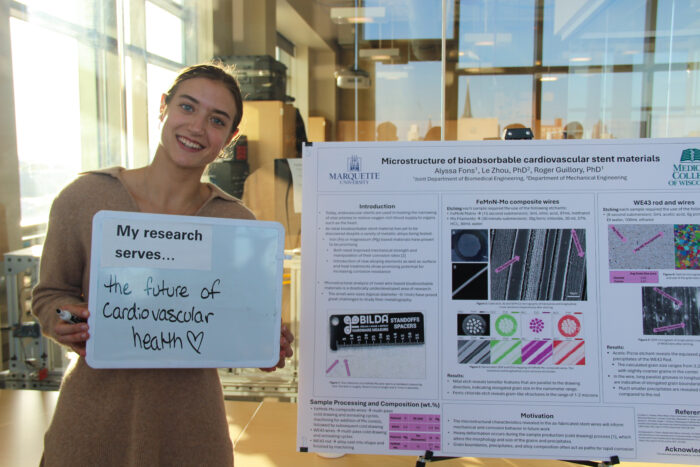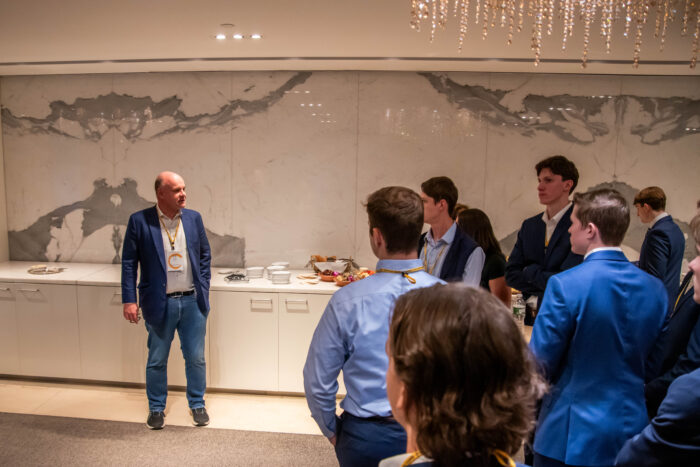Through a $1.6 million grant from the National Institutes of Health — the first of its kind in the Midwest — Marquette’s U-RISE program is helping undergraduates from underrepresented groups prepare for careers in scientific research

By Brian Hudgins, photos by Alex Nemec
Junior Ahman Edwards received a strong signal that helped better define his emerging interest in science and medicine: Seeing his late great-grandmother battle Alzheimer’s disease stimulated his interest in neurology.
“She did not know my name,” Edwards says in describing her final months. “She would ask me who my mom was, and that intrigued me, to find out how she could ask me the same question a minute later.”
After he completed his first two years as an undergraduate biomedical sciences major at Marquette, Edwards faced a dilemma. If he did not have enough financial resources, the Sidon, Mississippi, native would have to pass on doing lab work — mentored by Dr. Matthew Hearing, H Sci ’03, assistant professor of biomedical sciences — that would have special value for him as a pre-med student and instead get a better-paying summer job.
Enter U-RISE. The two-year undergraduate research training scholarship program is designed to provide guidance for underrepresented students, including first-generation students and women, who plan to pursue doctoral study (M.D. and Ph.D. degrees) and research careers in biomedical sciences.
Marquette is the first Midwestern university to receive a National Institutes of Health grant to implement U-RISE. The $1.6 million, five-year grant was awarded in April. Dr. SuJean Choi, professor of biomedical sciences, heads the U-RISE at Marquette program. Three other principal investigators collaborated with her on the grant planning: Hearing; Dr. Laurieann Klockow, clinical professor and associate chair of instruction in biomedical sciences; and Dr. Kimberly D’Anna-Hernandez, associate professor of psychology.
“We have four students in U-RISE and hope to grow to eight per year staggered over two years,” Choi says. “Hopefully, we can grow that up to 20 students.”
The initial student stages involve choosing a research lab and mentor prior to the start of the junior year. The students go through a Summer Research Training Bootcamp to meet the U-RISE leadership team and their student peers. During that junior year, students are required to enroll in a Path to Research course and participate in a weekly U-RISE seminar.

For Edwards, the beginning of U-RISE is the next step in a journey that started taking shape early during his teen years. “Ever since ninth grade, I told people I was going to Marquette,” Edwards says. “I knew I wanted to go into medicine. A lot of U-RISE was geared right up my alley. You have to do an essay talking about how you can contribute.”
An April interview was the next step. “I got an interview and I was sweating during that interview,” Edwards says with a laugh. “That was in April and I got the decision in May. I was nervous during that whole time.”
The U-RISE green light meant Edwards could keep working in Hearing’s lab heading into his junior year before the intro bootcamp (fortunately, he’d already made that research connection as a sophomore). The juniors will present their research at U-RISE Research Day, work on preparing grad school applications and participate in a scientific seminar series.
Choi and the principal investigators created six credit hours of course work for the U-RISE students, which includes the three-credit Path to Research course, designed to give juniors more familiarity with the postgraduate path to becoming a researcher. The process builds on the beginning bootcamp by preparing students to do lab research, work on their own projects and learn how to write a research grant during the junior and senior years. “The goal is to get students accepted into Ph.D. postgrad programs,” Choi says.
In addition to the academic benefits, there is another perk for students who might be hundreds or thousands of miles from home. The grant allows for the payment of up to $16,000 in tuition each year and a monthly stipend. “Hopefully, the students will not need to pick up a second source of income outside their schoolwork,” Choi says.
Becoming part of the U-RISE community has enabled Edwards to connect with fellow aspiring neuroscientists. After he completed the program application and interview, Edwards discovered that a fellow student had also discussed her neurology interests during the process. He encountered familiar faces during each step. “I thought it was cool that Dr. Hearing, a man I worked with, also got to interview me for U-RISE,” Edwards says.
That support system is designed to help Edwards and his peers flourish. “Society portrays scientists generally as male and Caucasian, so these students have few role models,” Choi says. “Research isn’t a commonly considered profession, and we hope to change that.”


